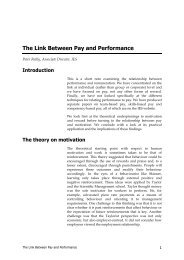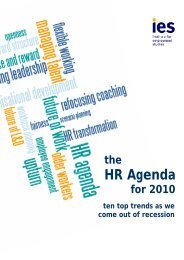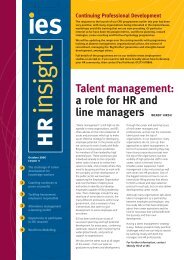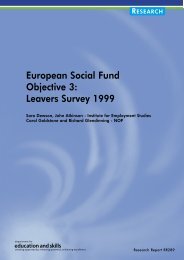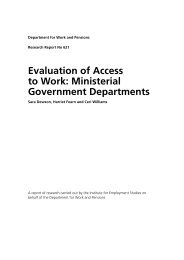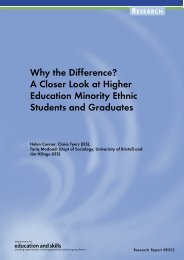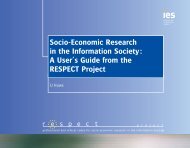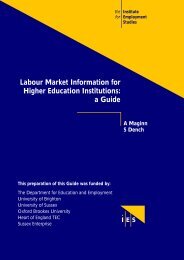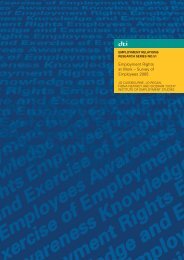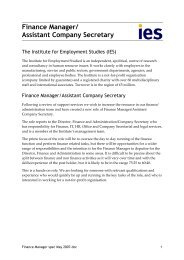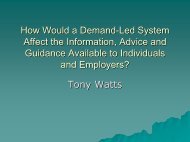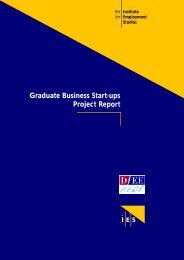Post-16 Transitions: a Longitudinal Study of Young People with ...
Post-16 Transitions: a Longitudinal Study of Young People with ...
Post-16 Transitions: a Longitudinal Study of Young People with ...
Create successful ePaper yourself
Turn your PDF publications into a flip-book with our unique Google optimized e-Paper software.
Chapter Six: Support<br />
Finances, benefits and Social Services<br />
Case studies – finances, benefits and Social Services<br />
By and large, financial issues do not appear as major factors in the<br />
case studies. One reason for this seems to be that the system <strong>of</strong> state<br />
benefits and allowances appears to be effective in meeting the<br />
financial needs <strong>of</strong> young people whose expectations <strong>of</strong> reward are<br />
relatively low. Li 1 for instance, who has somewhat low expectations <strong>of</strong><br />
himself, sees his £30 Educational Maintenance Allowance as an<br />
important inducement to stay on his course. Asked what are the good<br />
things about the course, he replied:<br />
“I get to paint and I get paid and everything just to be there,<br />
that’s the only reason.”<br />
Gareth has his benefits paid to his mother and then she places a<br />
proportion into his bank account for him to manage himself. However,<br />
he has modest personal needs. His social life revolves around family<br />
activities, a youth club and attendance at voluntary schemes, he<br />
cannot travel independently and all he really needs money for is to<br />
spend on his computer. Not surprisingly therefore, he is perfectly<br />
happy <strong>with</strong> the allowance he receives. Stuart is in a similar situation,<br />
paid an allowance from the disability benefit managed by his parents<br />
and finding that perfectly adequate to meet the limited needs that<br />
arise whilst he is in residential college. Similarly, Matthew, although<br />
capable <strong>of</strong> greater independence, seems content <strong>with</strong> his Jobseeker’s<br />
Allowance, though he is heavily subsidised by his family. Indeed,<br />
family support seems to be a common pattern and is a second reason<br />
why financial issues do not feature prominently.<br />
Simon is delighted <strong>with</strong> his financial independence, but he makes<br />
no contribution to his upkeep, his mother buys him all his clothes<br />
and he has no ambitions to set up house for himself. Joshua is one<br />
<strong>of</strong> the more independent young people in the sample, has an<br />
active social life and holds down a part-time job, but nonetheless<br />
remains living at home and therefore has no great financial needs.<br />
Emma receives Jobseeker’s Allowance but gives her mother only<br />
£10 per fortnight <strong>of</strong> this towards her upkeep. Her parents are<br />
relaxed about this situation, however:<br />
‘…now she has a bit <strong>of</strong> cash in her pocket that’s hers, she has gone a bit<br />
wild <strong>with</strong> it and not thinking about the important things. To her it is<br />
buying a couple <strong>of</strong> CDs, unnecessary things but that I suppose is being<br />
a teenager, they all go through that.’<br />
There are two situations, however, where financial problems do seem<br />
likely to arise. The first is where the young person has ambitions to be<br />
more independent than their financial situation will allow. The obvious<br />
1 All names have been changed to protect the identities <strong>of</strong> the young<br />
people who took part in the case studies.<br />
<strong>16</strong>0<br />
<strong>Post</strong>-<strong>16</strong> <strong>Transitions</strong> <strong>of</strong> <strong>Young</strong> <strong>People</strong> <strong>with</strong> SEN: Wave 2



